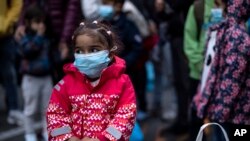U.N. officials, on the occasion of World Refugee Day, are warning the COVID-19 pandemic poses an additional threat to millions of refugees and displaced people, among the most vulnerable in the world.
More people live in forced exile than ever before. The U.N. refugee agency says refugees account for nearly 30 million of the record-breaking 79.5 million uprooted by conflict and persecution. An overwhelming majority live in poor countries with fragile economies and health systems.
World Health Organization Director General Tedros Adhanom Ghebreyesus, says refugees’ living conditions put them at particular risk of coronavirus infection.
“They often have limited access to adequate shelter, water, nutrition, sanitation and health services …," said Tedros. "WHO is deeply concerned about the very real and present danger of widespread transmission of COVID-19 in refugee camps.”
U.N. High Commissioner for Refugees Filippo Grandi agrees with this assessment. However, he notes most refugees are not in camps but in communities with local people. In some places, he says, those communities have been devastated by the pandemic.
“I am thinking of Latin America where 17 to18 countries host more than 4 million Venezuelans on the move," said Grandi. "I am thinking of many urban centers in Africa that are host to large refugee populations. I am thinking of Afghans in Pakistan and Iran that share… facilities and accommodation with communities that have been impacted very severely by COVID.”
Grandi says he also is extremely concerned about the impact of COVID-19 on livelihoods. He says most refugees have lost their jobs because of lockdowns and other measures.
He says refugees who have lost their incomes cannot pay for health care. It is of utmost importance, he says for governments to include refugees, displaced people and other people on the move in their national health responses to the pandemic.
He says this is key to stopping the pandemic, noting the coronavirus makes no distinction between citizens of a country and those who have been forcibly uprooted from their homes and live within their midst.





